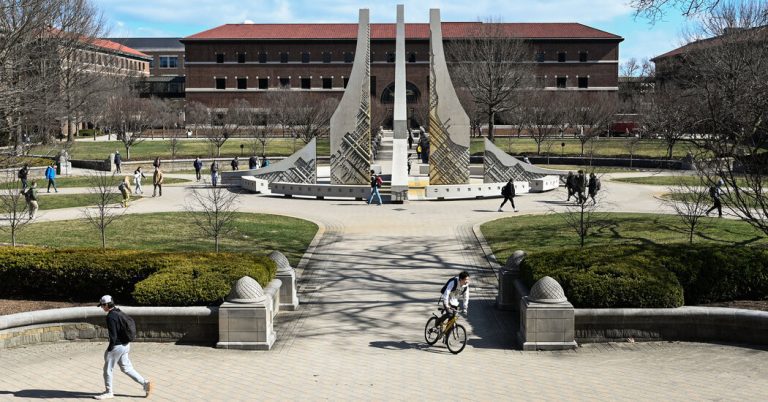A new law in Indiana requires professors at public universities to foster a culture of “intellectual diversity” or face disciplinary action, including dismissal even for those with tenure, the latter in a Republican effort to assert more control over what is taught at the classes.
The law ties the employment status of faculty members, regardless of whether they are tenured, to whether, in the eyes of a university’s governing board, they promote “free research” and “free expression.” State Sen. Spencer Deery, who sponsored the bill, made it clear in a statement that this would involve including more conservative views on campus.
Reaction to the legislation, which was signed into law by Gov. Eric Holcomb, a Republican, on March 13 has been substantial. Hundreds wrote letters or testified at hearings, and faculty senates at several institutions had urged the legislature to reject the bill, denouncing it as government overreach and a blow to academic free speech.
“The whole point of tenure is to protect academic freedom,” said Irene Mulvey, president of the American Association of University Professors, who described the law as “thought policing.”
Colleges across the country have been plagued by debates about academic freedom in recent years. Several states, including Florida, Texas and Nebraska, have proposed term-limit bills, some of which have passed. More generally, Republican-led states have targeted diversity programs at universities. Bills that curtailed or eliminated these programs have had more success becoming law, with such measures being implemented in at least half a dozen states.
Under the Indiana law, which takes effect in July, university administrators are barred from granting tenure or promotion to faculty members deemed “unlikely” to promote “intellectual diversity” or expose students to work from a range of political views. Administrators can also deny tenure or promotion to those found to be “likely” to bring irrelevant political views to the courses they teach.
Faculty members already in tenure will be subject to regular reviews to determine whether they meet all of these criteria, and if the board determines they do not, they could be demoted or dismissed. The law also requires colleges to establish a process for students or other employees to file complaints about faculty members deemed not to meet these requirements.
Boards may not, by law, punish faculty for criticizing the institution or engaging in political activity outside of their teaching duties. Restrictions do not apply to private university faculty members.
“I have faith in our public universities to faithfully implement this law to promote the successful growth and intellectual vitality of academia while protecting the rights of all individuals,” Governor Holcomb said in a statement.
In outlining the rationale for the legislation, Mr. Deery, a Republican, pointed to surveys showing a significant decline in the number of Republicans who have confidence in higher education, a drop many say about the proper characterization of a professor who brings political views into the classroom. He also cited controversies that have erupted in recent months over anti-Semitism on college campuses, leading to the resignation of university presidents and demands for greater oversight by university administrators.
“Recent events and blatant anti-Semitism have exposed the hyper-politicization and monolithic thinking of American institutions of higher education, and many are warning that universities have lost their way,” Mr. Deery said after the bill passed in the Senate. The legislation, he said, “urges the leaders of these institutions to correct course.”
Alice Pawley, a professor of engineering education at Purdue University, said many faculty members at Indiana were outraged by the new restrictions and that “no one believes this is going to be applied fairly.” Many felt discouraged about their job security, believing they would be at the mercy of managers who were not experts in their field and would make decisions based on highly subjective criteria, Dr Pawley said.
“This policy is a clever way to appear reasonable, but it creates a climate where people are always looking over their shoulders to see who is going to judge them,” he said.
Even some troubled by the lack of conservative voices on college campuses were skeptical. Keith E. Whittington, a politics professor at Princeton University, expressed concern about the law’s vagueness, including uncertainty about what it would take to meet the requirements.
What distinguishes Indiana’s law from other similar measures, according to Dr. Whittington, is that it “doesn’t try to punish people for bringing controversial ideas into their classrooms.” Instead, it “tries to punish people for not introducing enough ideas into their classrooms. And that’s still an interference with people’s professional judgment about what to teach.”
In practice, Dr. Whittington said there will be a lot of teachers who are “running scared and trying to figure out not only, ‘How do I build a classroom that I think is intellectually coherent and satisfying and educationally useful?’ but also “”How can I protect myself from possible dismissal?”




